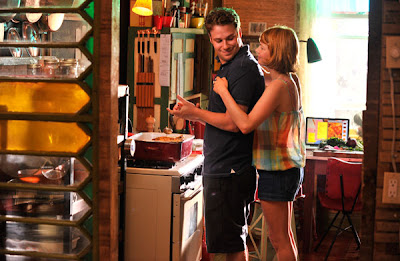Local documentary filmmakers Michael Palmieri and Donal Mosher return to the NW Film Center tonight for the Portland premiere of their latest collaborative work, Off Label. Inspired by the work of Carl Elliott (author of "Better Than Well" and "A Philosophical Disease"), the film is an exploration of the unethical practices of big pharmaceutical companies, ranging from the use of "human guinea pigs" to the encouraging of physicians to prescribe medications for off label uses.
Palmieri and Mosher do an interesting thing with the film. They allow their subjects to tell the story without any intrusion from narration, text, or primary sources drawn from corresponding literature. It creates an overall shape for the piece that is a bit more subjective than most documentaries on like topics. But it also focuses the attention on the human aspect of the subject, showing a preference for exposing the impact rather than obsessively combing over statistical information; such work has been performed elsewhere, though some additional context is provided by former pharmaceutical rep Michael Oldani.
Like their previous feature-length documentary, October Country, this is a beautifully shot piece. One could easily watch it for the endless stream of vividly rendered imagery alone. But paired with the intimacy of the interviews, it forms a strikingly provocative piece about a problem that many would prefer to ignore. Off Label doesn't allow you to tune out the pain of its subjects. You'll leave the film still grappling with what you've witnessed.
Tonight's screening is a one-night-only event. Hopefully, there will be other chances to see the film in town in the near future, if so, I'll post about it here or on the blog's Facebook page.
Off Label screens
at the NW Film Center's Whitsell Auditorium (in the Portland Art
Museum) on Wednesday, August 1st at 7pm. More info available here.
Remember to find and "like" us on our Facebook page.
Subscribe to the blog's feed here.




























